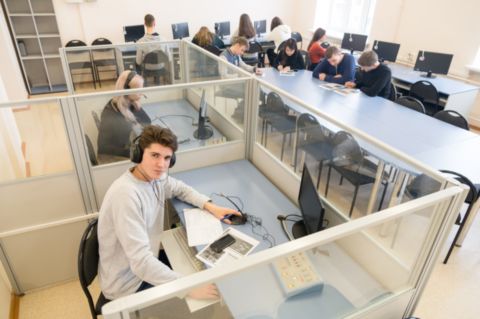The processes of integration, globalization and cultural exchange are changing our world from day to day. A translator, acting as an intermediary in intercultural communication, plays a special role in these processes. The profession has been in demand for many years and has not lost its popularity. The Department of Linguistics and Translation Studies of the Institute of Linguistics and International Communications opens enrolment in a Master's degree programme with new majors.
Master's degree studies
The Department invites those wishing to enrol in the Master's degree programme on the Theory and Practice of Translation, specialization 45.04.02 Linguistics. Students are offered an in-depth study of two foreign languages, translation and intercultural communication, mastering the ways of using digital technologies in professional activities, and much more.
"In the age of digitalization, modern translators must be able to use computer technologies in their professional activities. Not so long ago, the Instruction of the President of the Russian Federation was announced, according to which the curriculum should include sections "on the study of artificial intelligence technologies and their use in various fields of activity"," says Professor, Doctor of Science (Philology), Head of the Department of Linguistics and Translation Studies Tamara Khomutova. "Our new Master's degree programme, along with fundamental and practical language disciplines and courses on mastering translation techniques, includes sections devoted to working with modern digital linguistic resources. The knowledge of modern technologies favourably distinguishes a specialist in translation."
Students master the strategies and methods of bilingual translation, study the specifics of written translation and interpreting of texts of various genres and topics. Special attention is paid to technical translation, which is especially in demand in our industrial region. The educational programme also includes an original course on simultaneous interpreting.
In the Master's degree programme 45.04.02 Linguistics, the issues of computer lexicography are considered. Students may study modern lexicographic resources, terminological databanks, which is especially important since the knowledge of translators in the terminology of certain fields is an in-demand skill with employers in our region.
Separate units of the Master's degree programme are aimed at mastering the ways of working with intelligent natural language processing systems, which make it possible to improve the efficiency of the translator's work.
.png)
Scientific Activities
There is an Innovation in Linguistics Research and Education Centre at the Institute of Linguistics and International Communications, which develops its own intellectual linguistic products, terminological databases, and automated translation systems. Students are involved in scientific projects; under the guidance of doctors and candidates of science, they master technologies focused on linguistic research and translation practice, and acquire the necessary knowledge and skills in specialized translation.
Employment and Practical Training
While obtaining their education, students have the opportunity to take practical training at the leading enterprises in our city and region, master the specifics of the work of a translator and prove themselves in a potential job. Graduates work at the leading enterprises of the Chelyabinsk Region: Fortum, Metran, Transneft, Russian Electric Motors, Chelyabinsk Zinc Plant, Chelyabinsk Metal Structures Plant, Konar, etc., as well as in international holdings and even in the UN. Translators are often involved in the translation of international meetings, negotiations, conferences, and special events.
If graduates decide to continue their professional path in the scientific field, they have such an opportunity: during their studies, Master's students participate in research-to-practice conferences, where they report on their scientific findings, and publish their first articles based on the research results. The research in the frameworks of the Master's thesis can become a good starting point for the subsequent doctoral thesis. The university provides postgraduate studies in several linguistic fields, where, under the guidance of doctors of philological sciences, Masters can continue their scientific research and receive a scientific degree.
Admissions
Bachelors and Specialists in both linguistic and non-linguistic fields are admitted to this programme. Bachelors of Arts in Linguistics can continue to improve their skills; applicants who have received a Bachelor's degree in other fields and speak English at a level no lower than Intermediate will be able to master a new field of activity and add essential translation competencies to the sum total of their professional skills.
Entrance trials – Master examination.




